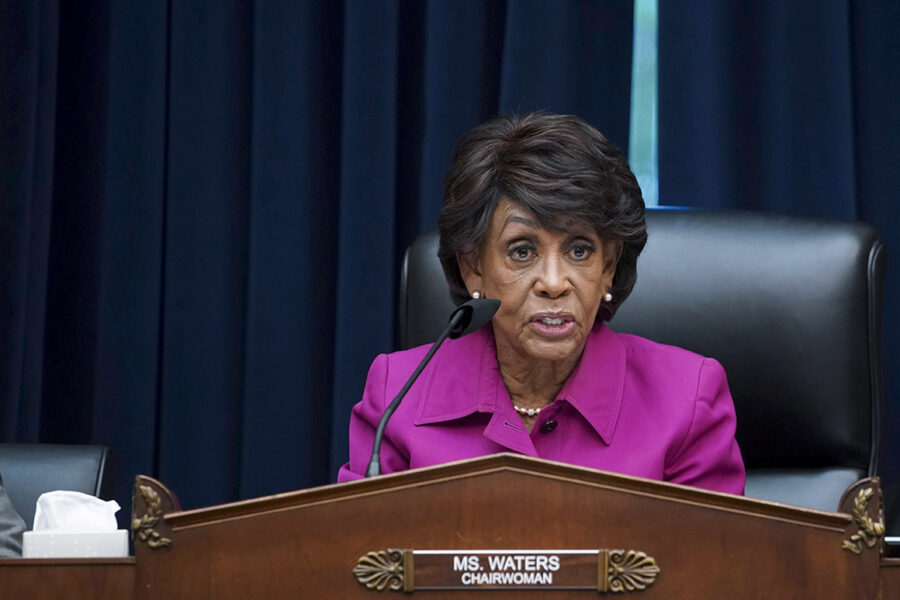Maxine Waters ready to battle over potential cuts to housing aid

The White House and congressional leaders are considering slashing $300 billion in housing aid proposed for Democrats’ $3.5 trillion social spending plan, setting up a clash with Rep. Maxine Waters and advocates who are vowing to protect the funds.
Hill aides and lobbyists said the housing money was on the chopping block as Democrats scrambled to find ways to lower the price tag of the budget reconciliation proposal by as much as $2 trillion. The $300 billion at issue would support down payment assistance, affordable home construction and several other housing programs.
Waters, who proposed the funding as chair of the House Financial Services Committee, said in an interview that “I’m going to fight as hard as I can to keep as much housing as I can in the reconciliation bill.” The cuts represented a major threat to a signature proposal from the California Democrat, who has prioritized affordable housing and homelessness throughout her time in office. Housing lobbyists were also mobilizing to shield their priorities in the sweeping plan.
“It’s going to be rough,” Waters said.
The emerging fight over how to trim housing aid is likely just one of several brewing conflicts between Democrats as they consider ways to appease moderates insisting on a smaller spending plan. It will force lawmakers and the administration to make tough choices about the party’s economic agenda and approach to racial equity, which has been a key focus of proposals to expand affordable housing. The stakes are high because the legislation marks Democrats’ best shot of advancing their biggest social and climate policy priorities for the foreseeable future.
Waters is urging negotiators to trim funding across the board rather than eliminate whole parts of the bill. She and every other Financial Services Committee Democrat signed a letter sent Wednesday to President Joe Biden, House Speaker Nancy Pelosi and Senate Majority Leader Chuck Schumer arguing that housing must be funded at “robust levels” in the legislation.
“My wish, if we have to cut, is that we’re all going to take about the same percentage cut across the board, and then [committee chairs] can figure out where we want to make those reductions” within each section, Waters said.
Industry lobbyists and housing advocates are also rushing to protect favored provisions. Civil rights groups are warning the White House that excluding housing investments from the bill amounts to dropping racial equity from the biggest social spending measure in a generation.
“We have all these coalitions of industry groups, housing groups, civil rights groups who are beating down the door of the White House to make sure that they keep housing provisions in the reconciliation bill,” said Lisa Rice, president and CEO of the National Fair Housing Alliance. “If you don’t address housing, you’re not going to be able to address anything else that you’re trying to get done from an equity standpoint.”
“I cannot possibly see the White House folding on this issue,” Rice added. “You cannot address issues of racial inequity if you do not address housing inequity — it is an impossibility. They’re so inextricably linked.”
Industry lobbyists representing firms that stand to benefit from the housing expansion are also tying their push for funding to the administration’s equity goals.
“Housing is the single biggest way for people to start on the ladder of economic opportunity in America,” said James Tobin, chief lobbyist at the National Association of Home Builders. “If this package is about bringing economic and social justice to people as the president has said, then housing needs to be a part of it.”
Two provisions of the package in particular would help people of color, according to advocates — a $10 billion measure to provide down payment assistance to first-time homebuyers whose parents did not or do not own a home, and a tax credit to incentivize the construction and rehabilitation of affordable housing in distressed areas, worth about $2 billion a year.
“They’re not that expensive, and I don’t understand how you could possibly focus a bill on your highest priorities and not include racial equity,” said David Dworkin, president and CEO of the National Housing Conference. “How do we tell people ‘Sorry, it’s not your bus,’ when everyone knows it’s the last bus?”
Rice agreed, calling it “a slap in the face” that lawmakers would cut a $10 billion measure to help first-generation home buyers with their down payments.
Without the housing money, she said, the plan would not advance racial equity.
“The message that we delivered to the White House is that what we’re really tired of is taking these public policy proposals and saying that they are for the benefit of people of color, saying they are racial equity measures when they are not,” Rice said. “We have such a long history of that — slavery, Jim Crow, segregation were all ‘for the benefit of Black people.’”
The White House did not respond to a request for comment on the status of housing money in the plan.
Megan Cassella contributed to this report.
Go To Source
Author: POLITICO

